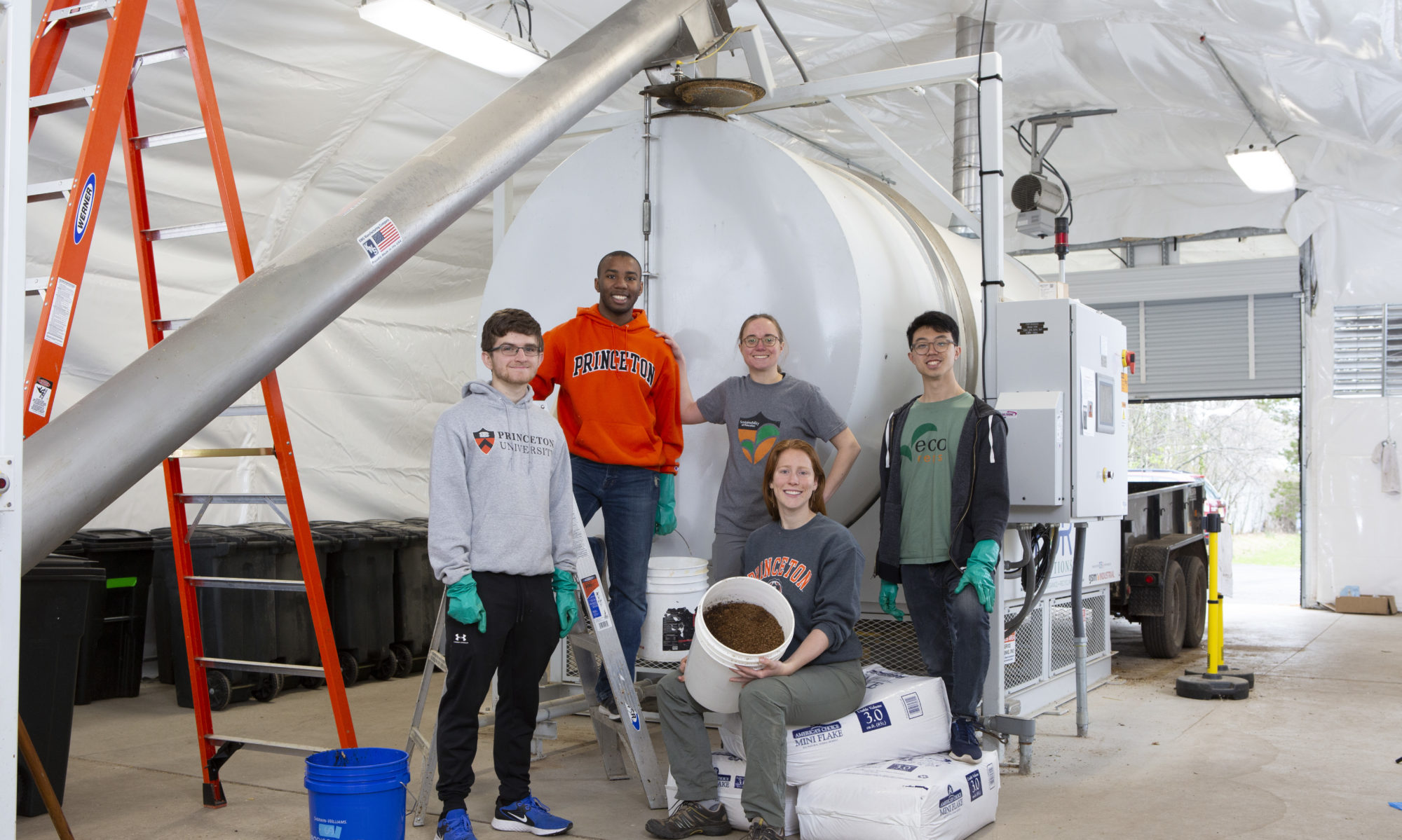BACKGROUND
In 2015, the U.S. EPA announced that the US will target a 50% reduction in food waste by 2030 to be in alignment with the United Nation’s Sustainable Development Goals (Goal 12.3). Yet the state of food scrap recycling was looking grim especially since a regional composting facility – the Wilmington Organics Recycling center in Delaware – had to be shutdown just a year prior due to odor complaints and stream contamination. The closure left the municipality of Princeton and cities from NYC to D.C. scrambling to locate new sites for their organic waste.
Meanwhile at the University, the idea of “Campus as Lab” or applied campus sustainability testing was taking root and Office of Sustainability director, Shana Weber, understood the need for more rigorous performance testing to advance the composting technology industry.
Around the same time, the Institute for Local Self-Reliance (ILSR) created several white papers/reports emphasizing the importance and need for more diverse and decentralized composting infrastructure at the local level. As shown in the food waste hierarchy below, the ILSR recommends developing a composting strategy that promotes home composting and small-scale farm and community sites as a priority, followed by onsite institutional systems (particularly at schools) and then the development of commercial capacity for remaining organics. The more place-based composting is, the greater the environmental and economic benefits to the surrounding community.

One emerging and promising technology was small-scale, in-vessel composting and there was a local New Jersey company called FOR Solutions that was offering a promising system that aimed to correct some of the design flaws of earlier technologies.
After securing a donor grant to purchase a FOR Solutions Model 1000 composting system, Dr. Weber was able to sell the idea of an on-campus food composting demonstration project to campus operating units and administrators. One of her main selling points was a very high and sustained interest from both students and faculty.
In 2016, Gina Talt ‘15 arrived as a post-baccaulerate fellow with the Office of Sustainability and helped launch the project implementation process. After two years of planning, construction, and coordination among multiple campus departments, the demonstration project launched in September 2018.
Due to the COVID-19 pandemic and a facility relocation, we had to temporarily pause the project in early 2020 for two and a half years. The project restarted in Fall 2022 at its new location on the Meadows Campus.
OVERVIEW
Now called the Sustainable Composting Research at Princeton (S.C.R.A.P.) Lab, the demonstration project is an investigation into using small-scale composting technology to advance campus sustainability goals around wasted food recycling and soil revitalization, while engaging the campus community and supporting Princeton’s core research & teaching mission. We hope to contribute to industry efforts in organics recycling as federal and state targets increasingly call for drastic cuts in wasted food.

System & Process
Every week, the University sends campus food scraps from Frist Campus Center, campus cafes, and a growing list of academic and residential building partners to the S.C.R.A.P. Lab. The uneaten food is loaded into the system along with a bulking agent/carbon source. The Model 1000 composting system uses a programmed rotation and aeration process to accelerate the aerobic decomposition of food scraps into nutrient-rich compost in only five to seven days. The compost is then brought to a stockpile yard where it remains until it can be applied on campus landscapes.
Watch this video for a behind-the-scenes tour.
Objectives
The S.C.R.A.P. Lab will support the University’s research and educational mission by providing an avenue of exploration through the Campus as Lab program, which works at the intersection of academics, operations and campus life to support applied learning and research around sustainability challenges. See our “Research” page for current projects and additional opportunities.
In addition to supporting the academic mission of the University, the S.C.R.A.P. Lab contributes to several campus sustainability impact priorities highlighted in Princeton University’s Sustainability Action Plan:
Reducing waste and expanding sustainable purchasing:
The project will both launch an investigation into the potential for all campus dining venues to become zero-waste facilities while providing an outlet for increased food scraps collection across campus to locations other than major dining venues. If done strategically, expanded food scraps collection would not only reduce landfill waste, but the number of loads of recyclable material that are rejected at the MRF (materials recycling facility) due to items coated with food residue.
Additionally, the S.C.R.AP. Lab will advance evidence-based sustainable purchasing solutions by studying the compostability of different food serviceware so that the items that the campus buys can be tied to compostable products whenever possible.
Cultivate healthy and resilient habitats:
When applied to soil, compost from the S.C.R.A.P. Lab will support the presence of microorganisms and key fungi which provide a range of benefits such as water retention, pollutant remediation, and greater plant access to nutrients. Healthy soil suppresses weeds, and healthy plants are less susceptible to diseases. Additionally, healthy soil and plants can contribute to reduced application and run-off of fossil-fuel based landscape inputs into the local environment. Thus the compost is expected to enhance the ecological health of the campus and surrounding region by promoting healthy soils and plants, and clean water and air.
Lastly, the S.C.R.A.P. Lab will contribute to the Office of Sustainability’s overarching goal in cultivating a Sustainability Ethos on the Princeton campus. Guided tours, progress reports, and educational and operational opportunities around this on-campus demonstration project will increase visibility and engagement in campus sustainability efforts. Students, faculty, and staff will become empowered to do their part in responsible food scraps management, both on and off-campus. See our “Resources” page for more information on how to compost at home.
